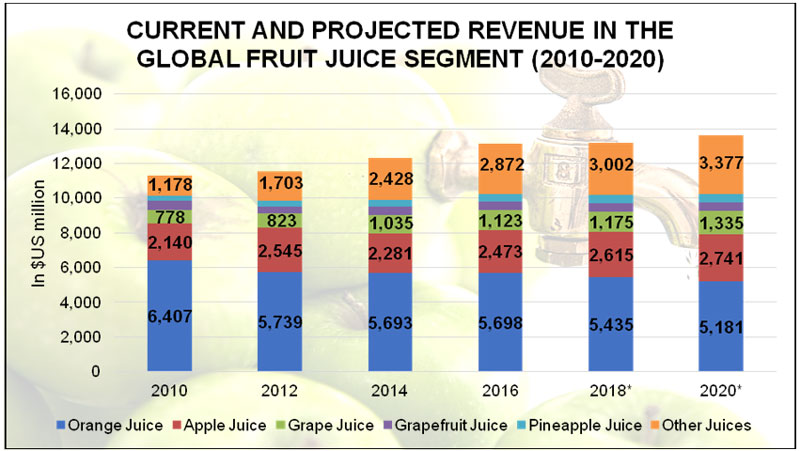Insight Survey’s latest SA Fruit Juice Landscape Report 2017 carefully unfolds the global and local fruit juice markets based on the latest information and research. It examines the market drivers and restraints, as well as global and local market growth, to present an objective and comprehensively nuanced insight into the South African fruit juice industry environment, market dynamics and its future.

On a global level, fruit juice revenue has seen a steady increase over the last few years from US$11.3 billion in 2010 to US$13.1 billion in 2016. Leading global markets such as the USA and Germany’s current consumption is 44 litres per capita. In contrast, the South African fruit juice industry consumption was approximately 12 litres per capita – a much smaller figure in comparison to many other countries, of course, but it is heartening to note, however, that a 7% increase was experienced in the retail volume in 2016 and, furthermore, that the market is expected to post a 5% retail volume CAGR up to 2021.
One of the potential reasons for this 2016 increase was the SA government’s awareness campaigns that continue to focus on orientating consumers towards healthier consumption habits.
The fruit juice industry is also becoming more creative and innovative to meet their target markets’ needs.
Brands are driving growth in the 100% juice category with new products that capture the imagination of consumers, stretching beyond traditional fruit juices such as orange and apple, to a range of inventive vegetable blends, and new fruit flavours, creating endless possibilities for new recipes.
Furthermore, HPP and/or cold-pressed juices initially were fringe products promoted by “juice cleansing” celebrities. These are, however, becoming increasingly mainstream, creating challenger brands, whose strong growth has attracted interest from major players.
There are several factors that could negatively impact the market. Notwithstanding South Africa’s fragile economy and continuing drought, the proposal for tax on sugar-sweetened beverages could potentially lead to a decrease in consumption of fruit juice among South Africans. This tax was due to come in effect in April 2017, but has been delayed to allow for further consultation.
Interestingly, this proposed tax could potentially lead to an increase in vegetable drinks consumption due to pure vegetable juices typically being lower in sugar content. This presents opportunities for both companies and entrepreneurs alike.
The Fruit Juice Industry Landscape Report 2017 (126 pages) provides a dynamic synthesis of industry research, examining the local and global fruit juice industry from a uniquely holistic perspective, with detailed insights into the entire value chain – from manufacturing to retailing, competitor positioning, latest marketing and advertising news for each competitor, pricing and promotions analysis, consumption and purchasing trends.
Some key questions the report will help you to answer:
- What are the key factors that are driving the growth of the local and global markets?
- What are the latest South African fruit juice trends, drivers and challenges?
- Who are the major South African fruit juice manufacturers and retailers?
- What is the pricing and recent promotions at retailers: concentrates and ready-to-drink?
- What have been the SA fruit juice consumption trends over the past few years?
Please note that the 126-page PowerPoint report is available for purchase for R25,000 (excluding VAT). Alternatively, individual sections can be purchased for R9,000 (excluding VAT). For additional information simply contact us at az.oc.yevrusthgisni@ofni or directly on (0)21 045-0202.
For a full brochure please go to: SA Fruit Juice Industry Landscape Report 2017.
About Insight Survey:
Insight Survey is a South African B2B market research company with more than 10 years of heritage, focusing on business-to business (B2B) market research to ensure smarter, more-profitable business decisions are made with reduced investment risk.
We offer B2B market research solutions to help you to successfully improve or expand your business, enter new markets, launch new products or better understand your internal or external environment.
Our bespoke Competitive Business Intelligence Research can help give you the edge in a global marketplace, empowering your business to overcome industry challenges quickly and effectively, and enabling you to realise your potential and achieve your vision.
From strategic overviews of your business’s competitive environment through to specific competitor profiles, our customised Competitive Intelligence Research is designed to meet your unique needs.
For more information, go to www.insightsurvey.co.za. Alternatively, contact +27 (0)21 045-0202.
